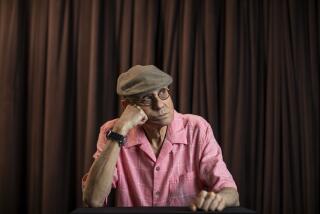Dr. Hyman Engelberg, 92; Marilyn Monroe’s Personal Physician
- Share via
Dr. Hyman Engelberg, Marilyn Monroe’s personal physician, who prescribed her sleeping pills and declared her drug-overdose death a suicide, has died. He was 92.
Engelberg died Monday of natural causes in a nursing home in Santa Monica, said Terry Kahn, a family friend.
In addition to treating a number of Hollywood celebrities, the physician was known for his research and writing on cardiovascular problems, especially the effects of the blood thinner heparin.
It was Engelberg who alerted the world more than four decades ago that the spectacularly popular blond actress, who remains an international cult figure, had been found dead in her Brentwood home.
“Marilyn Monroe has died. She’s committed suicide,” the doctor reported at 4:25 a.m. on Aug. 5, 1962, in a phone call to the Los Angeles Police Department. “I’m Dr. Hyman Engelberg, Marilyn Monroe’s physician. I’m at her residence. She’s committed suicide.”
Monroe’s housekeeper, Eunice Murray, had summoned the actress’ psychiatrist, Dr. Ralph Greenson, and Engelberg after seeing Monroe sprawled on her bed. Engelberg pronounced her dead about 3:50 a.m.
Engelberg told The Times that long-ago Sunday that he had prescribed Nembutal capsules only two or three days before her death, and that she was to take one each night to help her sleep. A 50-capsule bottle of the sedative, found among some 15 medicine bottles on her nightstand, was empty. Monroe had seen the physician frequently in the troubled weeks before her death.
Los Angeles County coroner Theodore J. Curphey said after an autopsy that his “presumptive opinion” was that death was due to an overdose of some drug. He opted not to conduct a formal inquest, but instead appointed a three-member team of mental health professionals to probe into her background, and they concluded her death was a probable suicide.
Police initially said the death was possibly accidental, but all officials agreed there was no indication of a crime. The Los Angeles County district attorney’s office was persuaded to reinvestigate the circumstances of her death in 1982, two decades after Engelberg said it was a suicide. But again prosecutors found insufficient facts to warrant opening a criminal inquiry.
Regardless of Engelberg’s assessment or official reports, rumors and conspiracy theories that Monroe was slain have persisted. At least two books have claimed she was killed in order to silence her about her romantic liaisons with President John F. Kennedy and Sen. Robert F. Kennedy and government secrets to which the affairs might have given her access.
The late actor Peter Lawford, who was married to the Kennedys’ sister Patricia in 1962, told The Times in 1984 that he had spoken with Monroe about 6 p.m. on the night she died and that he was worried about her depression.
Engelberg, who was described by police as despondent after examining Monroe’s body, discussed her battle with manic depression and chemical dependency in the documentary, “Marilyn Monroe: The Final Days,” released in 2001. The documentary was included with Fox’s DVD set “Marilyn Monroe: The Diamond Collection.”
In addition to Monroe, Engelberg treated nearly 100 Hollywood celebrities, among them Burt Lancaster, Danny Kaye, Rita Hayworth, Dore Schary and Walter Matthau.
At the time of Engelberg’s death, Kahn said, the physician had been working on a book about his experiences with entertainers. Kahn said the working title was “Doctor to the Stars: The Chutzpah Doctor,” an allusion to what Groucho Marx once called Engelberg when both were members of the Friars Club.
Engelberg was known in medical circles for his research projects, including a 1965 study showing the changes in blood caused by nicotine. The study, he reported in the Journal of the American Medical Assn., explained why heavy smokers were more prone to heart attacks than non-smokers, and why people who stop smoking reduce their risk of heart attacks to that of non-smokers.
More controversial was Engelberg’s study in the early 1990s, reported in the British medical journal the Lancet, showing that people on low-fat diets were prone to commit violence because of an inability to absorb the brain chemical serotonin.
Engelberg was a prolific writer, contributing scores of articles to medical journals and publishing several books, including “Your Heart’s Best Friend -- The Untold Story” (1986), “Heparin and the Prevention of Arteriosclerosis” (1990) and “Cholesterol: Truth and Humbug” (1991).
Born in New York City, Engelberg earned his bachelor’s degree and his medical degree from Cornell University, qualifying as a doctor by the remarkably young age of 22. He was a physician with the rank of lieutenant in the Army Air Forces during World War II.
“He was the Doogie Howser of his generation,” said Kahn, referring to the popular 1989-93 television sitcom “Doogie Howser, M.D.” about a teenage genius hospital resident.
Engelberg completed his own residency at Los Angeles’ Cedars of Lebanon Hospital, forerunner of Cedars-Sinai Medical Center, and set up practice in Beverly Hills. He was affiliated with Cedars-Sinai throughout his career and earned its Pioneer in Medicine Award in 2004.
He also received an achievement award from the Angiology Research Foundation in 1969. Engelberg was president of the California Arteriosclerosis Research Foundation in 1960.
The doctor is survived by his wife, Colleen; three sons, all of whom are physicians, Michael, Alan and Lon; five grandchildren and five great-grandchildren.
More to Read
Sign up for Essential California
The most important California stories and recommendations in your inbox every morning.
You may occasionally receive promotional content from the Los Angeles Times.













